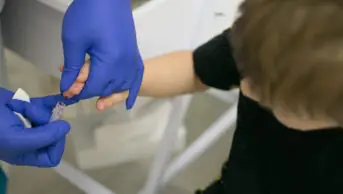
Shutterstock.com
Boots UK is planning to trial a private screening service for type 2 diabetes mellitus (T2DM) from May 2023 in seven stores across the UK, it has announced.
In a statement issued on 14 March 2023, the multiple said the service will be offered in stores located in Manchester, London and Birmingham, “as these cities have a higher prevalence of T2DM”.
It added that the service — which will cost patients £19.99 — “could roll out to more stores in the next year”, depending on demand from patients.
During the screening appointment, suitable patients will give blood via a finger prick test, which will be analysed using the LumiraDx HbA1c diagnostic test. The test provides a result within seven minutes.
If the result indicates potential T2DM, the patient will be advised to discuss their result with their GP.
Sebastian James, managing director of Boots UK, said: “There are currently around 850,000 people living with undiagnosed diabetes and we want to help address that.
“As well as having community pharmacies like Boots perform screening tests, there could be an expanded role for diabetes management in community pharmacy. Our pharmacy team members could support with checks when patients collect their medicines and feed this information back to their GP via their patient record. That could be really powerful.”
James added that Boots could deliver these tests on behalf of the NHS and would welcome conversations with national and local service commissioners.
Hannah Beba, a consultant pharmacist in diabetes at Leeds Health and Care Partnership, commented: “Using more point-of-care testing in screening programmes will be something exciting for the future, we do know that there are many undiagnosed cases of diabetes out there.
“I am concerned around any service that is adopted in a way that is disconnected to the rest of the healthcare system, especially one which has significant implications on downstream workloads and person expectations,” she added.
“Many point-of-care testing machines need to be appropriately calibrated and, depending on the system being used, there can be variability in accuracy of result provided. False positive results may generate considerable unnecessary workload for primary care teams.
“Asking for payment for these tests will be something that has the potential to drive inequality and this is another reason why point-of-care testing should be considered as part of a programme of work within systems of care.”
Hannah Syed, a specialist diabetes pharmacist at East Sussex Healthcare NHS Trust, said the screening service “will help detect people living with undiagnosed type 2 diabetes in local communities; however, the challenge will be around affordability”.
“Often type 2 diabetes prevalence is high within deprived communities and so many people may not be be able to afford the cost of this service. Hopefully this initiative will drive discussions within integrated care systems to enable equitable access through locally commissioned schemes.”
Boots began expanding its ‘Online Doctor’ service in June 2021, with patients now able to access treatments for more than 45 conditions, including treatments for asthma, costing up to £158 for two inhalers, hormone replacement therapy at a cost of up to £96 for a consultation and prescription, and adrenaline auto-injectors costing up to £99 for two pens.
Then, in March 2022, the multiple launched an online private mental health service offering treatments for depression and anxiety for £65 per month.
Speaking to The Pharmaceutical Journal in January 2022, Marc Donovan, chief pharmacist at Boots, said: “The delivery of private services through community pharmacy is certainly growing and we think that’s good for patients and, importantly, good for the NHS as well.
“The availability of that kind of service … has alleviated some of the pressure from the NHS by taking non-complex healthcare interventions away from GP surgeries.”


